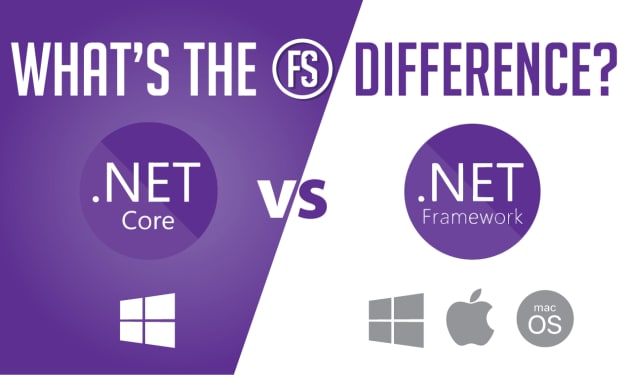.Net core with AngularJS and .Net core with React JS
What are the differences between?

.NET Core is a popular open-source, cross-platform framework for building web applications using various programming languages such as C#, F#, and VB.NET. AngularJS and ReactJS are two popular JavaScript frameworks used to build single-page web applications.
The main difference between using .NET Core with AngularJS and .NET Core with ReactJS lies in the way the frontend of the application is built. AngularJS is a complete framework for building dynamic web applications, while ReactJS is a library for building user interfaces.
When using .NET Core with AngularJS, the frontend and backend of the application are built as separate entities. The AngularJS framework is used to create the frontend of the application, which communicates with the .NET Core backend through HTTP requests. AngularJS provides features like dependency injection, data binding, and component-based architecture that help in building complex web applications.
On the other hand, when using .NET Core with ReactJS, the frontend is built using the ReactJS library. ReactJS uses a component-based architecture that allows for the creation of reusable UI components. The .NET Core backend communicates with the ReactJS frontend through APIs or RESTful services.
In summary, the main difference between using .NET Core with AngularJS and .NET Core with ReactJS is in the way the frontend of the application is built. AngularJS is a complete framework for building dynamic web applications, while ReactJS is a library for building user interfaces. Both frameworks have their own strengths and weaknesses, and the choice between them depends on the specific requirements of the application.

Here are some additional differences between .NET Core with AngularJS and .NET Core with ReactJS:
Language: AngularJS is a JavaScript framework, while ReactJS is a JavaScript library. .NET Core is a backend technology that supports multiple programming languages, including C#, F#, and VB.NET. When using AngularJS, you'll be writing JavaScript code for the frontend, whereas with ReactJS, you'll be using JSX syntax to write your UI components.
Architecture: AngularJS follows the Model-View-Controller (MVC) architecture, while ReactJS follows a unidirectional data flow architecture. MVC is a pattern used for separating the concerns of an application, whereas unidirectional data flow is a pattern used to manage the state of an application.
Learning curve: AngularJS has a steeper learning curve than ReactJS. AngularJS is a complete framework with its own set of concepts and conventions, whereas ReactJS is a more lightweight library that focuses on the view layer of an application.
Performance: ReactJS is known for its high performance due to its virtual DOM implementation, which allows for efficient rendering of UI components. AngularJS, on the other hand, can be slower in some cases due to its two-way data binding approach.
Community and ecosystem: Both AngularJS and ReactJS have large and active communities with plenty of resources and third-party libraries available. However, AngularJS has been around for longer and has a more established ecosystem, whereas ReactJS is newer and has a faster pace of development.
Size and complexity: AngularJS is a large and complex framework that can be overwhelming for smaller projects. It has a steep learning curve and requires developers to learn many concepts and conventions. ReactJS, on the other hand, is a more lightweight library that can be easier to learn and use.
Componentization: Both AngularJS and ReactJS support component-based architecture, but they approach it differently. AngularJS uses directives to create reusable UI components, whereas ReactJS uses JSX syntax to define components. JSX allows developers to write declarative and expressive UI components that are easy to read and maintain.
Templates: AngularJS uses HTML templates to define the structure and layout of an application's UI. These templates can be easily modified by designers and non-technical team members. ReactJS, on the other hand, uses JavaScript to define the structure and logic of an application's UI, which can be less accessible for non-technical team members.
Development tools and support: Both AngularJS and ReactJS have strong developer tools and support, but they differ in their approach. AngularJS comes with a set of tools and libraries that provide a comprehensive development experience, whereas ReactJS relies on the broader JavaScript ecosystem for development tools and libraries.
Compatibility: AngularJS and ReactJS have different compatibility requirements with .NET Core. AngularJS requires integration with a frontend build tool like Webpack or Gulp, while ReactJS can be integrated directly with .NET Core's server-side rendering feature.
Overall, the choice between using .NET Core with AngularJS and .NET Core with ReactJS depends on a variety of factors, including project requirements, team expertise, and personal preferences. Both frameworks are powerful tools for building modern web applications and have their own strengths and weaknesses. It's important to evaluate them carefully before making a decision.
-AR
About the Creator
Abdul Razack
Writing has been my passion. Fiction, poetry, and fanfiction are my favorite forms of storytelling. Writing movie reviews is something I enjoy doing.
Feel free to subscribe, leave a comment, and spread the love






Comments
There are no comments for this story
Be the first to respond and start the conversation.